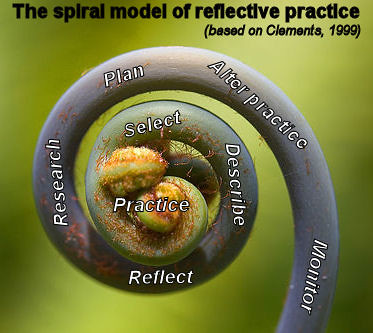 |
| Aluminum coated beam splitter. wikimedia (Zaereth 2011) |
Reflection on my last 24 weeks of study.
 |
| The spiral model of reflective practice (based on Clements, 1999). Image CC from Flickr (Soma, 2009) |
Three things you have learned about yourself as a learner (metacognitive process)
I used to see my perfectionism as a strength, however, now I see it as a challenge to overcome. I struggled to accept work that was not polished and refined so I did not enjoy the short time constraints of collaborative class activities because for me the satisfaction was not in the completion, but it completing a piece to a high standard. This has been difficult for me to adjust to in terms of 'just in time" teaching or handing in work (even in a rough state) was better than not handing it in. These last two assignments are testament to this.I now consciously adopt Carol Dweck's "growth mindset" (Dweck, 2013) in order to accept my failings as temporary setbacks rather than summative confirmations of 'talent' or lack thereof. I believe I can learn just about anything with enough resources, time and focus. I am enjoying learning things like Arduino which I used to consider 'too hard'.
I realised that I was on the right lines with my experiments with blended learning and flipped learning models. I can now more effectively use online learning resources such as CodeCademy or CodeAvengers.com in my teaching and have strategies to use summative quizes to guage learners progress. I also realise that whilst I like to learn visually from a wide range of resources, much like a sketch artist or watercolourist painter who uses broad brush strokes to get the big picture and iteratively build in detail. I realise that that doesn't work for others who may feel over whelmed by too much information if there is an embarrassment of riches from too many possible sources.
I realise the need to apply UDL (Universal Design for Learning) principles as digital natives are not lazy but lack attentions spans from the overwhelming abundance of information in the digital realm and social media. Multi-tasking is a coping mechanism. I have learnt that it is not terribly effective and I need to monotask and set myself personal Kanbans to work through tasks,
Three key changes in your own practice:
I no longer feel that I must be the "Sage on the Stage". I am prepared to learn from the students too - akonga can teach / learn together. I am better able to facilitate rather than teach. To pose questions rather than supply answers. I can emotionally deal with lack of certainty and feel happier seeing the students struggle and fail.
In order to better manage the students' learning I am using data from online teacher dashboards like in Code.org so that I can help those who are trying to fly under the radar. I have encourage students to enter competitions such as the IITPTechHub & RSNZ CREST Team Bronze Awards.
I have encouraged 20% time, student agency and choice of projects and encouraged peer programming and project based learning and teamwork.
I have adopted agile methods with frequent customer feedback (with pivots if necessary) rather than a strict waterfall approach to planning the curriculum. I used to use Design Thinking through an ADDIE approach, however the waterfall method meant there was no going back and reflection at the end of the teaching learning was too late for changes in the current cohort's experience.
| Creative Commons - Flickr from http://www.speedofcreativity.org (Hinckley, 2014) |
I encourage students to persevere. I used to see this as essentially a question of character or lack of gumption. I used to think students were too often predisposed to give up. But now I see it is important for me as the teacher to model the framing of failure as an important step in the process.
I now actively encourage the F.A.I.L. acronym: First Attempts In Learning. I also encourage more Constructivist exploratory learning rather than teaching and lecturing. However, I don't think that this works for all students for deep and detailed content (infinite failure and barking up the wrong tree is wasteful of resources - not everyone is an autodidact) unless it is carefully guided scaffolded.
I have reflected that the key to good teaching is more than just subject knowledge it is also knowledge of your students and having positive relations with them. It is summed up nicely in this blog: http://www.speedofcreativity.org/2015/11/26/students-need-teacher-relationships-not-just-adaptive-software-videos/ which posits that KhanAcademy.org algorithms alone cannot replace teachers because as social creatures we need socialisation in education.
References:
Hinckley, G.B. August 29, 2014. You have not failed until you quit trying. Retrieved from https://www.flickr.com/photos/pictoquotes/15036483126
Soma, D.J. OCtober 20, 2009. Reflective Practice Spiral. Retrieved from https://www.flickr.com/photos/43413412@N03/4031039030
Zaereth, March 23, 2011. "Flat metal-coated beamsplitter" - Own work. Licensed under CC0 via Commons - Retrieved from https://commons.wikimedia.org/wiki/File:Flat_metal-coated_beamsplitter.png#/media/File:Flat_metal-coated_beamsplitter.png
References:
Hinckley, G.B. August 29, 2014. You have not failed until you quit trying. Retrieved from https://www.flickr.com/photos/pictoquotes/15036483126
Soma, D.J. OCtober 20, 2009. Reflective Practice Spiral. Retrieved from https://www.flickr.com/photos/43413412@N03/4031039030
Zaereth, March 23, 2011. "Flat metal-coated beamsplitter" - Own work. Licensed under CC0 via Commons - Retrieved from https://commons.wikimedia.org/wiki/File:Flat_metal-coated_beamsplitter.png#/media/File:Flat_metal-coated_beamsplitter.png
No comments:
Post a Comment